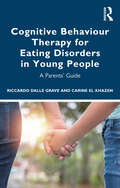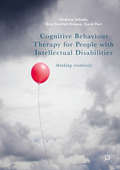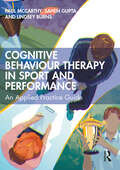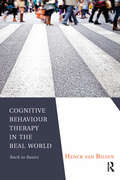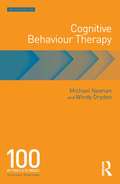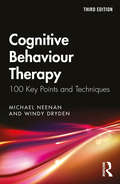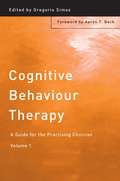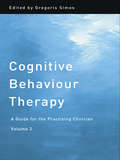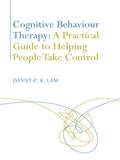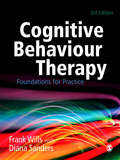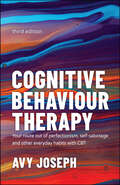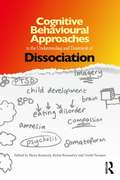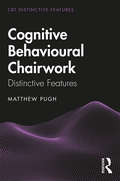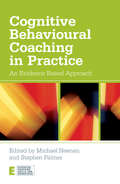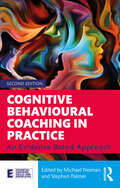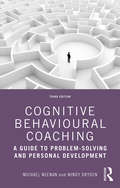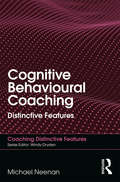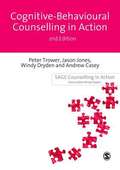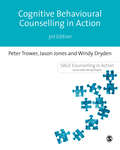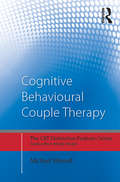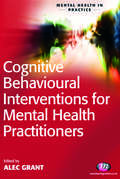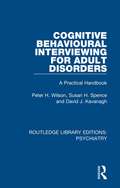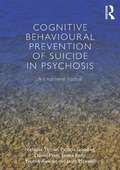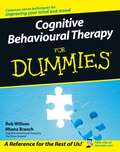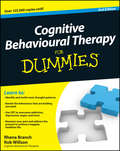- Table View
- List View
Cognitive Behaviour Therapy for Eating Disorders in Young People: A Parents' Guide
by Riccardo Dalle Grave Carine el KhazenCognitive Behaviour Therapy for Eating Disorders in Young People is a state-of-the-art guide for parents based on enhanced cognitive behaviour therapy (CBT-E), one of the most effective treatments for eating disorders and recently adapted for adolescents. Part I presents the most current facts on eating disorders. Part II provides parents with guidance on how to support their child’s recovery. The book will be of interest to parents of teenagers with eating disorders treated with CBT-E and also for clinicians using CBT-E with young patients.
Cognitive Behaviour Therapy for People with Intellectual Disabilities: Thinking creatively
by Andrew Jahoda Biza Stenfert Kroese Carol PertThis book examines the influence others have on the lives of people with intellectual disabilities and how this impacts on their psychological well-being. Based on the authors' clinical experiences of using cognitive behavioural therapy with people who have intellectual disabilities, it takes a social interactionist stance and positions their arguments in a theoretical and clinical context. The authors draw on their own experiences and several case studies to introduce novel approaches on how to adapt CBT assessment and treatment methods for one-to-one therapy and group interventions. They detail the challenges of adapting CBT to the needs of their clients and suggest innovative and practical solutions. This book will be of great interest to scholars of psychology and mental health as well as to therapists and clinicians in the field.
Cognitive Behaviour Therapy in Sport and Performance: An Applied Practice Guide
by Paul Mccarthy Lindsey Burns Sahen GuptaMany sport and performance psychologists worldwide practise cognitive behaviour therapy (CBT) as a therapeutic and applied practice approach. But no textbook currently offers a blueprint to understand and use CBT in sport and performance settings.Cognitive Behaviour Therapy in Sport and Performance: An Applied Practice Guide builds upon a tangible foundation for the practice of CBT and related techniques in sport and performance contexts. This new book presents key points to help students and practitioners bring CBT into the sport and performance context. We focus on the ‘what is’ and the ‘how to’.Drawing upon the latest research and a wealth of applied practice experience, this easy-to-use guide takes the reader through each step of the CBT process with case examples, plain instructions, and worksheets to maximise the quality and depth necessary for effective CBT practice.As an applied guide, this book educates undergraduates and postgraduates in sport and performance psychology (and all its variants). This book is an instrumental guidance material for sport and exercise psychology students but also invaluable as a practice guide for performance psychology trainees in applied practice placements and as a refresher primer for established professionals.
Cognitive Behaviour Therapy in the Real World: Back to Basics
by Henck Van BilsenThis book provides an introduction to cognitive behaviour therapy in combination with a transdiagnostic perspective on mental health problems. It presents an overview of assessment and formulation strategies that enable therapists to compose individualised treatments for their clients.
Cognitive Behaviour Therapy: 100 Key Points and Techniques (100 Key Points)
by Windy Dryden Michael NeenanIn the last three decades cognitive behaviour therapy (CBT) has been applied to an ever-increasing number of problems (including anxiety disorders, substance abuse, and eating disorders) and populations (children, adolescents, and older people). NICE recommends CBT as the first line treatment in the NHS for tackling a wide range of psychological disorders. Cognitive Behaviour Therapy: 100 Key Points and Techniques is a crisp, concise elaboration of the 100 main features of this very popular and evidence-based approach within the field of psychotherapy. The 100 key points and techniques cover CBT theory as well as practice. Divided into helpful sections, topics covered include: - Misconceptions about CBT - Teaching the cognitive model - Assessment and case conceptualization - Homework (self-help assignments) - Ways of detecting and answering NATs - Behavioural experiments - Intermediate and core beliefs - Relapse management - Third wave CBT For the second edition of this book, Michael Neenan and Windy Dryden have revised and updated many of the points and several new ones have been added. This neat, usable book is an essential guide for psychotherapists and counsellors, both trainees and qualified, who need to ensure they are entirely familiar with the key features of CBT as part of a general introduction to the current major psychotherapies.
Cognitive Behaviour Therapy: 100 Key Points and Techniques (100 Key Points)
by Windy Dryden Michael NeenanCognitive Behaviour Therapy: 100 Key Points and Techniques is a crisp, concise elaboration of the 100 main features of the very popular and evidence-based CBT approach within the field of psychotherapy. In recent decades CBT has been applied to an ever-increasing number of problems (including anxiety disorders, substance abuse and eating disorders) and populations (children, adolescents and older people). With newly incorporated material on supervision, this extensively revised and updated third edition covers CBT theory and practice. Divided into helpful sections, the topics covered include: Misconceptions about CBT Teaching the cognitive model Assessment→case conceptualization→treatment planning Ways of detecting and answering negative automatic thoughts (NATs) Homework (between-session assignments) Conducting behavioural experiments Uncovering and restructuring intermediate and core beliefs Relapse management Resistance Supervision Third wave CBT This compact, usable book is an essential guide for psychotherapists and counsellors, both trainee and qualified, who need to ensure they are entirely familiar with the key features of CBT as part of a general introduction to the current major psychotherapies.
Cognitive Behaviour Therapy: A Guide for the Practising Clinician, Volume 1
by Gregoris SimosAlthough Cognitive Behavioural Therapy (CBT) has a well elaborated theoretical background and documented standard therapeutic process, new specific theoretical formulations and genuine techniques seem to continually appear. These new treatment developments in CBT constitute the heart of this book.Leading researchers and clinicians, who are also well established experts in the application of CBT present the extent of their experience, as well as appropriate and state-of-the-art treatment techniques for a variety of specific disorders:* Management of Major Depression, suicidal behaviour and Bipolar Disorder.* Treatment of Anxiety Disorders such as Panic Disorder, Obsessive Compulsive Disorder, and Generalized Anxiety Disorder.* Application of CBT to Eating Disorder and Personality Disorders, especially Borderline Personality Disorder.* Implementation of CBT with specific populations such as couples and families, children and adolescents.The book focuses on clinical practice and treatment techniques, but avoids a step-by-step approach.Instead it encourages flexibility and integrativity in order to help the practicing clinician become more competent and efficient in applying CBT. Well-known contributors reveal a variety of treatment styles, and case examples and treatment transcripts are used to show how theoretical innovations integrate with the practice of CBT.
Cognitive Behaviour Therapy: A Guide for the Practising Clinician, Volume 2
by Gregoris SimosCognitive Behaviour Therapy: A Guide for the Practising Clinician, Volume 2 brings the practising clinician up to date with recent developments in the continuously expanding field of cognitive behaviour therapy (CBT). As with the first volume, this book is a clinically orientated and techniques-focused CBT manual, dealing with specific clinical conditions, skilfully blending guiding theories, focused techniques and clinical flexibility. With contributions from distinguished clinicians and researchers, a variety of specific disorders are examined, including: • Social anxiety disorder, CBT for psychoses, preventing relapse in depression;• Posttraumatic stress disorder, health anxiety;• Body dysmorphic disorder, pathological gambling, medical illness. These disorders are also discussed in the context of up-to-date processes and approaches, such as homework assignments, compassion-focused therapy and metacognitive-focused therapy. As such this book, along with the first volume, will be essential reading for all CBT practitioners, mental health professionals and students alike.
Cognitive Behaviour Therapy: A Practical Guide to Helping People Take Control
by Danny C. LamCognitive Behaviour Therapy: A Practical Guide to Helping People Take Control explores the premise that negative beliefs play an important role in the development and continuation of mental health problems. The book offers a new integrative model of causality for instigating change, based on giving clients control and choice over these beliefs, and therefore over their mood and behaviour. This practical guide also focuses on the stigmas often attached to people with 'mental illness'. Danny C. K. Lam suggests that by providing both the client and the general public with a more accurate understanding of the nature and causes of mental health problems it is possible to de-stigmatise the 'mental illness' label. This will help the client improve self-esteem and the ability to manage personal and interpersonal difficulties and take control of their problems and responsibility for recovery. Divided into six parts, this book covers: stigma, prejudice and discrimination from societal perspectives the nature and cause of emotional upsets a therapeutic framework for change self-prejudice, personal and interpersonal issues good and bad methods of communication practical approaches to assessing problems methods of taking control. This cognitive behavioural approach to mental health problems is an innovative contribution to the field. Illustrated throughout with clinical examples and practical advice, the book is essential reading for all of those involved in mental health, from nurses to counsellors, and from medical practitioners and social workers to ministers of religion.
Cognitive Behaviour Therapy: Foundations for Practice
by Diana J Sanders Frank Wills'A delightful volume, with unique style and content. This new edition amply lives up to the authors' aim of demonstrating a mode of CBT practice that incorporates many exciting developments whilst retaining the reassuring strength of the original parsimonious model.' Ann Hackmann, Oxford Mindfulness Centre, University of Oxford 'One of the very best introductions to CBT, now enhanced with excellent coverage of new developments.' Professor Neil Frude, Consultant Clinical Psychologist 'My first choice recommendation for trainee therapists. This outstanding and easy-to-read introduction just got better.' Peter Simpson, Senior Lecturer in Mental Health, University of Glamorgan In their established guide to contemporary CBT theory and practice, the authors show how therapeutic change takes place across a network of cognitive, emotional and behavioural functioning. They explain the central concepts of CBT and illustrate - with numerous case examples - how these can effectively be put into practice at each stage of the therapeutic process. They also explain how the essence of cutting edge 'third wave' can be integrated into everyday clinical practice. With two new chapters on mindfulness and increasing access to CBT, a wider coverage of client issues, extra case studies and learning resources, and a discussion of recent developments, this book continues to be the ideal companion for those working - or training to work - in the psychological therapies and mental health. Frank Wills is an independent Cognitive Psychotherapist in Bristol and tutor at the University of Wales Newport. Diana Sanders, Counselling Psychologist and BABCP Accredited Cognitive Psychotherapist in Independent Practice, Oxford.
Cognitive Behaviour Therapy: Your Route out of Perfectionism, Self-Sabotage and Other Everyday Habits with CBT
by Avy JosephUncover the secrets of CBT and apply them to your own life In the newly revised Third Edition of Cognitive Behaviour Therapy, veteran cognitive behaviour therapist and counsellor Avy Joseph delivers an essential and accessible discussion of how to use the time-tested and proven techniques in cognitive behaviour therapy (CBT) to improve your own life and the lives of others. You’ll learn to challenge negative thoughts and unhealthy beliefs about yourself and begin improving your outlook on your personal and professional life. In the book, you’ll find updated scenarios and exercises for the practice of CBT techniques, discussions of how to maintain your mental health in a post-pandemic world and the difference between “Action Tendencies” and behaviours. You’ll also get: Insightful discussions about recent advances in Rational Emotive Behaviour Therapy (REBT) and how it fits with CBT Practical strategies for creating a more realistic perception of the events in your life, along with specific techniques – like understanding the difference between malicious and non-malicious envy Tips for developing emotional responsibility in practiceA can’t-miss resource for anyone interested in using CBT to solve their most intractable personal and professional problems, as well as those looking for evidence-based personal improvement techniques, Cognitive Behaviour Therapy will also earn a place in the libraries of CBT practitioners and therapists seeking a hands-on and accessible treatment of the discipline’s most essential subjects.
Cognitive Behavioural Approaches to the Understanding and Treatment of Dissociation
by Helen Kennerley David Pearson Fiona KennedyThe study of dissociation is relevant to anyone undertaking research or treatment of mental health problems. Cognitive Behavioural Approaches to the Understanding and Treatment of Dissociation uses a cognitive approach to de-mystify the processes involved in linking traumatic incidents to their effects. Kennedy, Kennerley and Pearson present a full and comprehensive understanding of mental health problems involving dissociative disorders and their treatment, bringing together an international range of experts. Each chapter addresses a single topic in full, including assessment of previous research from a cognitive perspective, recommendations for treatment and case studies to illustrate clinical approaches. Using an evidence-based scientific approach combined with the wisdom of clinical experience, the authors make the relevance of dissociation immediately recognisable to those familiar with PTSD, dissociative identity disorder, eating disorders, hallucinations and a wide range of psychological and non-organic physical health disorders. Designed to provide new perspectives on both research and treatment, Cognitive Behavioural Approaches to the Understanding and Treatment of Dissociation includes a wide range of material that will appeal to clinicians, academics and students.
Cognitive Behavioural Chairwork: Distinctive Features (CBT Distinctive Features)
by Matthew PughCognitive Behavioural Chairwork: Distinctive Features provides a practical, accessible, and concise introduction to both the theory and practice of chairwork, one of the most powerful and exciting methods of intervention in cognitive behavioural therapy (CBT), and is the first book to synthesise its many applications in CBT and allied therapies.Part of the popular 'CBT Distinctive Features' series, this book contains a wealth of effective experiential procedures for working with automatic thoughts, emotions, behaviours, core beliefs, ambivalence, strengths, well-being, and cognitive processes such as worry and self-criticism. Readers will also learn how chairwork is applied in other areas, such as clinical supervision and associated psychotherapeutic approaches including compassion focused therapy, schema therapy, positive psychotherapy, and motivational interviewing. Techniques are presented in an easy-to-understand format and illustrated using clinical examples and therapy transcripts. The result is a comprehensive guide which demystifies chairwork and places it at the heart of CBT’s continued evolution.Created for practising clinicians, researchers, and training therapists, Cognitive Behavioural Chairwork: Distinctive Features will appeal to both individuals who are new to chairwork and those who are familiar with its techniques.
Cognitive Behavioural Coaching in Practice: An Evidence Based Approach (Essential Coaching Skills and Knowledge)
by Michael Neenan Stephen PalmerCognitive Behavioural Coaching in Practice explores various aspects of coaching from within a cognitive behavioural framework. Michael Neenan and Stephen Palmer bring together experts in the field to discuss topics including: procrastination stress performance self-esteem perfectionism goal selection socratic questioning. This highly practical book is illustrated throughout with lengthy coach–coachee dialogues that include a commentary of the aims of the coach during the session. It will be essential reading for both trainees and professional coaches whether or not they have a background in psychology. It will also be useful for therapists, counsellors and psychologists who want to use coaching in their everyday practice.
Cognitive Behavioural Coaching in Practice: An Evidence Based Approach (Essential Coaching Skills and Knowledge)
by Michael Neenan Stephen PalmerThis fully updated second edition of Cognitive Behavioural Coaching in Practice explores various aspects of coaching from within a cognitive behavioural framework. In response to the continued growth in the popularity and scope of coaching and cognitive behavioural therapy, Michael Neenan and Stephen Palmer again bring together experts in the field to discuss topics including procrastination, stress, coaching alliance, motivational interviewing, goal selection and self-esteem. The book is illustrated throughout with coach–coachee dialogues that include a commentary of the aims of the coach during the session. This second edition is fully updated and includes three new chapters on single-session coaching, health and wellbeing coaching and coaching supervision. Part of the Essential Coaching Skills and Knowledge series, this comprehensive volume will be essential reading for coaches, as well as therapists, counsellors and psychologists.
Cognitive Behavioural Coaching: A Guide to Problem Solving and Personal Development (Coaching Distinctive Features Ser.)
by Windy Dryden Michael NeenanThe way we think profoundly influences the way we feel and behave. Therefore, it can be said that learning to think differently can enable us to feel and act differently. Derived from the methods of cognitive behaviour therapy, Cognitive Behavioural Coaching: A Guide to Problem Solving and Personal Development shows you how to help yourself by tackling self- and goal-defeating thinking and replacing it with an effective problem-solving outlook. This book gives clear and helpful advice on: Dealing with troublesome emotions Overcoming procrastination Becoming assertive Tackling poor time management Developing persistence Developing resilience Handling criticism constructively Taking risks and making better decisions Originally titled Life Coaching: A Cognitive Behavioural Approach, the third edition of this book has been considerably revised and updated to reflect current thinking on some of the topics discussed. This book will be invaluable to all those who are interested in becoming more personally effective in their everyday lives, and to counsellors, coaches and psychologists, students and qualified alike.
Cognitive Behavioural Coaching: Distinctive Features (Coaching Distinctive Features)
by Michael NeenanMichael Neenan clearly and accessibly introduces the 30 Distinctive Features of cognitive behavioural coaching (CBC), an approach which applies the principles of CBT to coaching. Cognitive Behavioural Coaching: Distinctive Features sets out the key theoretical and practical features of CBT and discusses how they integrate into the generic model of coaching. The book covers the four key elements in developing a coaching relationship, provides psychological and practical problem-solving models, shows how to deal with stuck points in coaching and identifies which individuals are unsuitable for CBC. As well as providing research evidence to support the effectiveness of CBC, the book demonstrates the smooth transition of CBT into CBC, and coach–coachee dialogues are interspersed throughout the text to show CBC in action. Cognitive Behavioural Coaching: Distinctive Features will be particularly useful to CBT therapists interested in adding coaching to their practice. It will also appeal to coaches in practice and in training and other professionals in coaching roles seeking an effective and straightforward coaching model.
Cognitive Behavioural Counselling in Action
by Windy Dryden Peter Trower Jason Jones Andrew CaseySince the 1988 edition, Trower (U. of Birmingham) notes that there has been exponential growth in the development and applications of cognitive behavioral therapy (CBT), a form of cognitive behavioral counseling that UK government policy makes widely available for emotional disorders. In an integrated approach, the authors cover the updated CBT model and practice plus basic principles of psychology that they consider insufficiently addressed elsewhere. Drawing on the cognitive models of Albert Ellis and Aaron Beck, they present a step-by-step general guide to CBT processes and applications to specific problems. The text includes case examples, excerpts from counselor-client and supervisor-trainee sessions, and appended clients' guides and worksheets. Annotation ©2011 Book News, Inc. , Portland, OR (booknews. com)
Cognitive Behavioural Counselling in Action (Counselling in Action)
by Windy Dryden Mr Jason Jones Dr Peter TrowerThis best-selling, practical, evidence-based guide to the cognitive behavioural approach takes you step-by-step through the process of counselling, from initial contact with the client to termination and follow up. The book follows a skills-based format based around the Bordin and Dryden model of bonds, goals, tasks and views, with expanded case material to further illustrate links between theory and practice. This third edition includes new content on: · the working alliance - what it is and why it is so important · challenges and pitfalls in the counselling process · when to challenge and when not to challenge clients beliefs · emotional problems such as shame, guilt and jealousy as well as anxiety, depression and anger. Drawing on their own extensive experience and contemporary research, the authors provide a concise overview of the cognitive behavioural approach, with new material on emotional problems rarely covered in practitioner guides, a strong emphasis on the therapeutic alliance, and updated bibliographic references throughout. Praise for the Previous Edition: "An elegant and informative guide to the practice of cognitive behavioural counselling ... recommended for all CBT practitioners." - Mick Power, Professor of Clinical Psychology, University of Edinburgh "A deserved best-seller for over 20 years. Peter Trower and colleagues have completely revised and updated the book in light of the enormous scientific achievements of CBT in this time. This brilliant book is essential reading for all cognitive behavioural practitioners." - Max Birchwood, Professor of Youth Mental Health, University of Birmingham ?"An absolutely wonderful book on cognitive behavioural counselling. It includes not only the basic information but also recent conceptual advances in the field. Truly, I cannot recommend this book highly enough!" - E. Thomas Dowd, International Editor, Journal of Cognitive Psychotherapy
Cognitive Behavioural Couple Therapy: Distinctive Features (CBT Distinctive Features)
by Michael WorrellCognitive Behavioural Couple Therapy (CBCT) is an enhanced and contextually grounded approach that provides evidence-based strategies for working with couple distress, as well as individual psychopathology in the context of a distressed relationship. Cognitive Behavioural Couple Therapy: Distinctive Features explores this truly integrative and experiential way of working. This model has significantly widened the traditional CBT focus on cognition and behaviour to include an equal emphasis on emotion, stable individual differences and vulnerabilities, as well as an awareness of the importance of the environment and the wider context for couple relationships. Comprising 30 key points, and divided into two parts – Theory and Practice – this concise book includes numerous clinical examples that illustrate the key features of Cognitive Behavioural Couple Therapy. It will offer essential guidance for students, practitioners experienced in individual CBT, as well as practitioners of couple therapy from other theoretical orientations who require an accessible guide to the distinctive theoretical and practical features of this contemporary approach.
Cognitive Behavioural Interventions for Mental Health Practitioners (Mental Health in Practice Series)
by Alec GrantIn line with current government policy and related recommendations, and evidence-based clinical practice guidelines, mental health students will be increasingly required to either engage in, or be appropriately familiar with, the principles of cognitive behavioural interventions. This book guides the reader through the fundamental principles of the approach in its various mental health application contexts, enabling them to gain the confidence to engage in the supervised, safe and evidence-based application of these principles. It will be a useful guide for mental health students who are experiencing their ′novice′ exposure to practice situations during their diploma or degree course.
Cognitive Behavioural Interviewing for Adult Disorders: A Practical Handbook (Routledge Library Editions: Psychiatry #24)
by Peter H. Wilson Susan H Spence David J. KavanaghOriginally published in 1989, the primary aim of this text was to provide a guide to the interview assessment of a wide range of common adult psychological problems. Emphasis is placed on the kinds of problems that were frequently encountered in outpatient centres at the time. The authors provide a general introduction to the nature and causes of each of the selected problems, with a focus on the kind of background knowledge that may be useful in the planning of initial interviews and the selection of appropriate interventions. Detailed examples are provided of the questions that may help elicit information on the history, severity, and causes of the problems for individual clients, and there is also a brief discussion of selected formal assessment instruments for each problem area. A major aim of the text is to teach basic principles of problem identification, behavioural analysis and a structured approach to assessment.
Cognitive Behavioural Prevention of Suicide in Psychosis: A treatment manual
by James Kelly Nicholas Tarrier Daniel Pratt Patricia Gooding Yvonne Awenat Janet MaxwellThis practical and informative text lays out the product of a number of years of clinical research into suicide behaviour and its prevention. While the focus is on non-affective psychosis and the schizophrenia-spectrum disorders, the mechanisms underlying suicide behaviour in this group may well underlie or at least influence suicide behaviour in other disorders. The authors describe methods of assessment through individual formulation, and a cognitive behavioural intervention through case studies, to reduce the risk of suicide. This book argues that: · Suicide behaviour lies on a cognitive-behavioural continuum from ideation, through intention to action. · Mechanisms based on biased information processing systems, the development of suicide schema, and appraisal styles are likely to be fruitful in explaining suicidal thoughts and behaviours. · A psychological theory of suicide behaviour is needed in order to develop a mechanism of suicide and to understand the components of suicidal thoughts and behaviours. · Suicide risk can be reduced through the use of the intervention methods described within the text Cognitive Behavioural Prevention of Suicide in Psychosis evaluates practical applications of contemporary research on this topic, and will therefore be of interest to practitioners, post-graduates in training, and researchers studying suicide and/or psychosis.
Cognitive Behavioural Therapy For Dummies
by Rhena Branch By Rob Willson"We all have aspects of ourselves that we would like to change, but many of us believe that a leopard can't change its spots - if that's you, stop there! Cognitive Behavioural Therapy for Dummies will help identify unhealthy modes of thinking - such as "a leopard can't change it's spots"! - that have been holding you back from the changes you want. CBT can help whether you're seeking to overcome anxiety and depression, boost self-esteem, lose weight, beat addiction or simply improve your outlook in your professional and personal life. "
Cognitive Behavioural Therapy For Dummies
by Rob Willson Rhena BranchAn updated edition of the bestselling guide on reprogramming one's negative thoughts and behaviourOnce the province of mental health professionals, CBT (or Cognitive Behavioural Therapy) has gained wide acceptance as the treatment of choice for anyone looking to overcome anxiety, manage anger, beat an addiction, lose weight or simply gain a new outlook on life. Written by two CBT therapists, this bestselling guide helps you apply the principles of CBT in your everyday life-allowing you to spot errors in your thinking; tackle toxic thoughts; refocus and retrain your awareness; and finally, stand up to and become free of the fear, depression, anger, and obsessions that have been plaguing you.Includes tips on establishing ten healthy attitudes for living as well as ten ways to lighten upHelps you chart a path by defining problems and setting goalsOffers advice on taking a fresh look at your past, overcoming any obstacles to progress as well as ways to maintain your CBT gainsIncludes new and refreshed content, including chapters on how to beat an addiction and overcome body image issuesWith indispensable advice on finding your way out of the debilitating maze of negative thoughts and actions, the book is brimming with invaluable suggestions that will have even a confirmed pessimist well armed for the journey forward.
